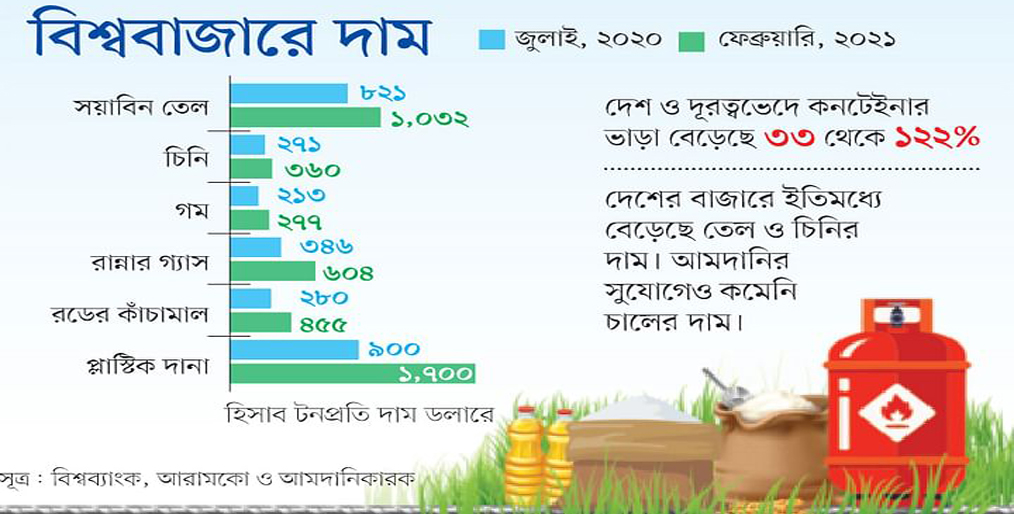
[caption id="attachment_6804" align="alignnone" width="1014"] File Photo[/caption]
While the price of soybean oil in the country's market is the highest in a decade, the world market is giving more worrying news. Prices of essential commodities such as rice, sugar, wheat, pulses and powdered milk are rising in exporting countries.
The traders are claiming that not only the price but also the shipping cost is higher for importing the goods. They say container fares have increased by 33 to 122 percent, depending on the country and distance.
The World Food Program (WFP) says global food prices have been rising for nine consecutive months, reaching 116 points at the end of February. Earlier, this price index was highest in 2013. What is the reason for the price increase? US investment bank JP Morgan Chase highlighted this in a report last month. They say that the recession that the Coronavirus has created in the global economy has created a great possibility of reversing the vaccine. As a result, the commodity market has also turned around. In addition, higher liberalization, higher inflation and a weaker dollar are the main reasons for rising commodity prices.
Amirul Haque, Managing Director of Sikkim Group, Chittagong, who has business in various sectors including edible oil, wheat, cement, gas, plastic, animal feed, compared the current situation in the world market with 2008 and 2011. He said prices of almost all commodities had risen since the latest global economic downturn. This time too such fears are seen. He said if the prices of daily necessities go up, people with limited income will be in danger. Traders are also at risk. Because of the instability in the world market in 2008, many importers of Bangladesh lost money. Then they could not survive.
Among the commodities that are rising internationally, Bangladesh is dependent on imports for edible oil, sugar, wheat, liquefied petroleum gas (LPG) and most of the industrial raw materials. When the price of products like sugar goes up, the cost of living of the people goes up directly. And industrial products indirectly increase the cost of living. For example, if the price of chicken food increases, the price of chicken increases. In the country's market, the price of Sonalika chicken has gone up by Tk 100 per kg to Tk 320 in a month, which is one of the reasons farmers are blaming the price of food. Again, the reason for the high price of cotton is that the price of clothes may go up in the coming holy Eid-ul-Fitr.
The government is also a little concerned about the situation in the world market. Commerce Secretary Mohammad Zafaruddin said, "We are monitoring the situation in the world market. There, the prices of import-dependent products are on the rise. A meeting with the concerned parties will be held in the middle of this month on the local market situation of the products related to the Ministry of Commerce.
Ramadan will start from mid-April. Concerned people say that there is a tendency to increase the price of goods without any reason due to the increased demand during Ramadan. This may include attempts to use the world market situation as an excuse.
Let's take a look at how much the price of the product has gone up in the world market. According to the World Bank, the price of soybean oil rose from Dollar 821 to 1,032 per tonne from July to February last year, sugar from 271 to 360 and wheat from 213 to 277.
[caption id="attachment_6805" align="aligncenter" width="1014"]
File Photo[/caption]
While the price of soybean oil in the country's market is the highest in a decade, the world market is giving more worrying news. Prices of essential commodities such as rice, sugar, wheat, pulses and powdered milk are rising in exporting countries.
The traders are claiming that not only the price but also the shipping cost is higher for importing the goods. They say container fares have increased by 33 to 122 percent, depending on the country and distance.
The World Food Program (WFP) says global food prices have been rising for nine consecutive months, reaching 116 points at the end of February. Earlier, this price index was highest in 2013. What is the reason for the price increase? US investment bank JP Morgan Chase highlighted this in a report last month. They say that the recession that the Coronavirus has created in the global economy has created a great possibility of reversing the vaccine. As a result, the commodity market has also turned around. In addition, higher liberalization, higher inflation and a weaker dollar are the main reasons for rising commodity prices.
Amirul Haque, Managing Director of Sikkim Group, Chittagong, who has business in various sectors including edible oil, wheat, cement, gas, plastic, animal feed, compared the current situation in the world market with 2008 and 2011. He said prices of almost all commodities had risen since the latest global economic downturn. This time too such fears are seen. He said if the prices of daily necessities go up, people with limited income will be in danger. Traders are also at risk. Because of the instability in the world market in 2008, many importers of Bangladesh lost money. Then they could not survive.
Among the commodities that are rising internationally, Bangladesh is dependent on imports for edible oil, sugar, wheat, liquefied petroleum gas (LPG) and most of the industrial raw materials. When the price of products like sugar goes up, the cost of living of the people goes up directly. And industrial products indirectly increase the cost of living. For example, if the price of chicken food increases, the price of chicken increases. In the country's market, the price of Sonalika chicken has gone up by Tk 100 per kg to Tk 320 in a month, which is one of the reasons farmers are blaming the price of food. Again, the reason for the high price of cotton is that the price of clothes may go up in the coming holy Eid-ul-Fitr.
The government is also a little concerned about the situation in the world market. Commerce Secretary Mohammad Zafaruddin said, "We are monitoring the situation in the world market. There, the prices of import-dependent products are on the rise. A meeting with the concerned parties will be held in the middle of this month on the local market situation of the products related to the Ministry of Commerce.
Ramadan will start from mid-April. Concerned people say that there is a tendency to increase the price of goods without any reason due to the increased demand during Ramadan. This may include attempts to use the world market situation as an excuse.
Let's take a look at how much the price of the product has gone up in the world market. According to the World Bank, the price of soybean oil rose from Dollar 821 to 1,032 per tonne from July to February last year, sugar from 271 to 360 and wheat from 213 to 277.
[caption id="attachment_6805" align="aligncenter" width="1014"] Picture: Collected[/caption]
According to a search at Chittagong port, wheat imported from Russia and Ukraine was unloaded last October at 222 to 233 per tonne (including ship fare). In January, Russian wheat prices rose to 290 a tonne.
During the month of Ramadan, the demand for lentils and gram increases. Importers claim that the price of these two types of pulses has gone up by more than Dollar 100 per tonne in four months. They say the price of gram has gone up by Dollar 630 per tonne and lentil pulses by Dollar 650-680 per tonne. According to Global Dairy Trade, a website that monitors the price of powdered milk, the price of powdered milk was below Dollar 3,000 per tonne last November. It surpassed 4,300 in February.
Soybean and palm oil prices have already risen sharply in the country's market. In a meeting with the Bangladesh Trade and Tariff Commission last week, traders proposed raising the price of soybean oil by another Tk 5 per liter. In two months, the price of sugar has gone up by Tk 5 per kg to Tk 65-70. Flour and flour prices have also risen slightly, traders said. Even after the government reduced the tariff and gave the opportunity to import rice, the price of rice did not come down.
Shahed Ul Alam, owner of RM Enterprise, a consumer goods company in Khatunganj, Chittagong, said the rise in prices in the international market has so far affected edible oil, sugar and peas. Despite the increase in the world market, the price of wheat is a bit lower due to higher imports. He said prices of other products are still stable. However, if the price increases in the world market, it will also affect the country.
Source: Online/SZK
Picture: Collected[/caption]
According to a search at Chittagong port, wheat imported from Russia and Ukraine was unloaded last October at 222 to 233 per tonne (including ship fare). In January, Russian wheat prices rose to 290 a tonne.
During the month of Ramadan, the demand for lentils and gram increases. Importers claim that the price of these two types of pulses has gone up by more than Dollar 100 per tonne in four months. They say the price of gram has gone up by Dollar 630 per tonne and lentil pulses by Dollar 650-680 per tonne. According to Global Dairy Trade, a website that monitors the price of powdered milk, the price of powdered milk was below Dollar 3,000 per tonne last November. It surpassed 4,300 in February.
Soybean and palm oil prices have already risen sharply in the country's market. In a meeting with the Bangladesh Trade and Tariff Commission last week, traders proposed raising the price of soybean oil by another Tk 5 per liter. In two months, the price of sugar has gone up by Tk 5 per kg to Tk 65-70. Flour and flour prices have also risen slightly, traders said. Even after the government reduced the tariff and gave the opportunity to import rice, the price of rice did not come down.
Shahed Ul Alam, owner of RM Enterprise, a consumer goods company in Khatunganj, Chittagong, said the rise in prices in the international market has so far affected edible oil, sugar and peas. Despite the increase in the world market, the price of wheat is a bit lower due to higher imports. He said prices of other products are still stable. However, if the price increases in the world market, it will also affect the country.
Source: Online/SZK
Comment Now